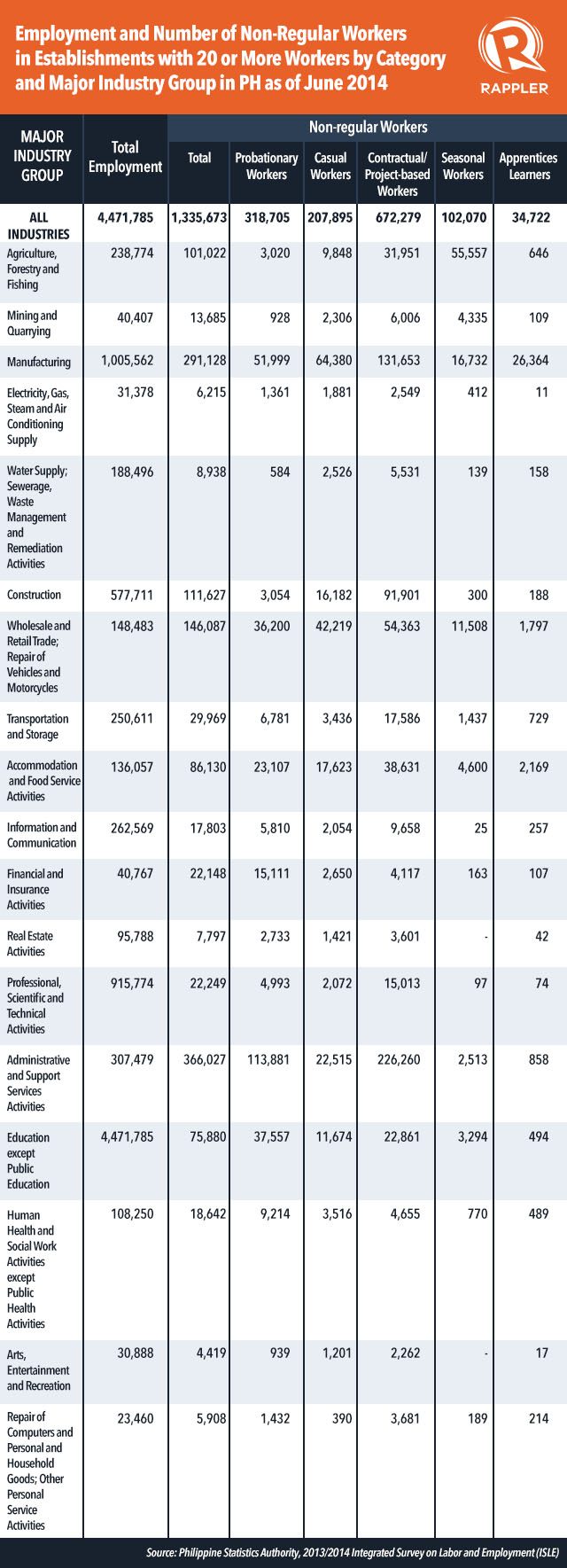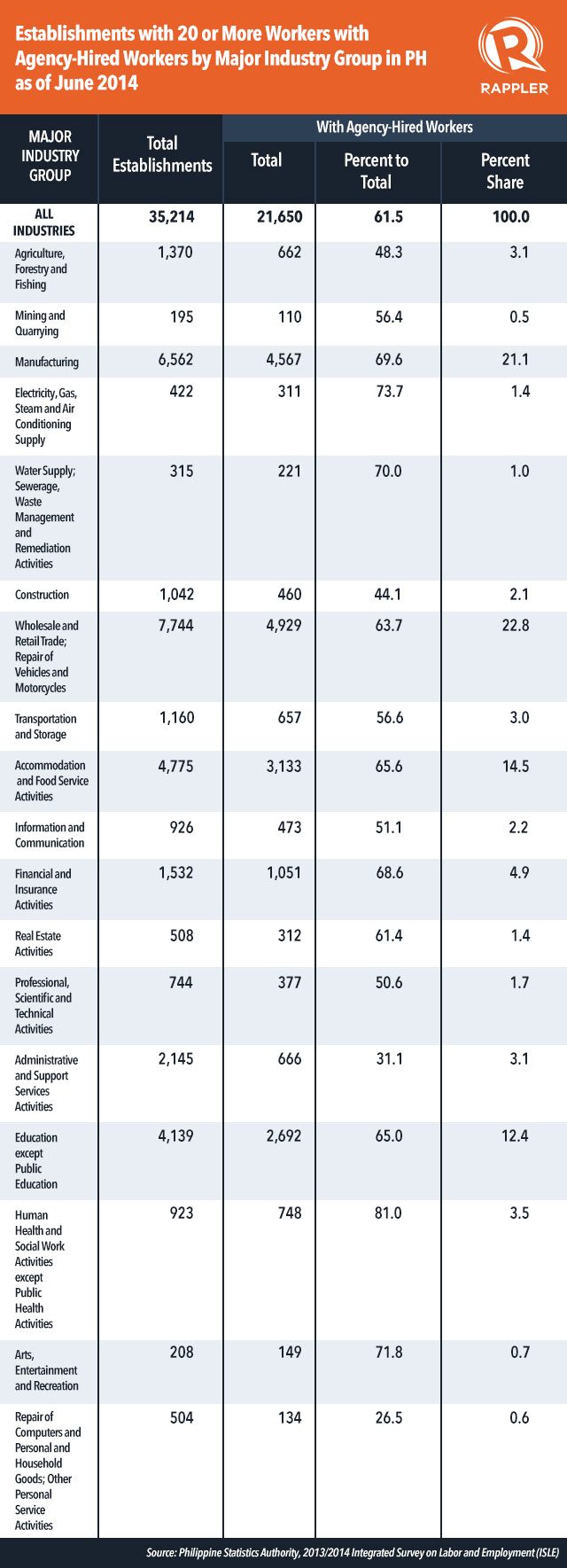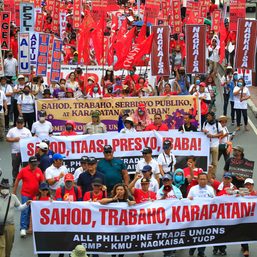SUMMARY
This is AI generated summarization, which may have errors. For context, always refer to the full article.

“Dati, kahit 5 months lang na kontrata, tatanggapin ko. Iniisip ko, mas okay na ‘yun kaysa wala,” said Maricon Tejol, a Human Nature merchandiser assigned to a supermarket in Makati.
(In the past, I would accept a 5-month job contract. I’d think that it’s better than nothing.)
Tejol’s line of thinking is illustrative of a bigger trend of workers constantly switching jobs due to short-term contracts. Before joining Human Nature, a local company that makes beauty products, she worked as a crew member of a fast food chain and as a promo girl for another firm.
A 5-month contract with no benefits is the norm for most merchandisers and factory workers in the Philippines, said Gandang Kalikasan, Incorporated (GKI), the company behind the Human Nature brand, in a statement on Sunday, May 1.
The company estimates around 35 million Filipinos have been hired as contractual workers.
GKI goes in the opposite direction by regularizing all its employees and giving them full benefits. It even has a no-firing policy.
“In all the years we’ve instituted the no-firing policy, only a handful have ever abused this while there have been dozens who have developed and exceeded our expectations. Whenever there are mistakes or abuses we have a system of escalating corrective actions depending on the gravity of abuse,” said GKI co-founder Anna Meloto-Wilk in an email to Rappler.
Meloto-Wilk explained that in the worst case scenario, these workers would have their designation or job position changed “because perhaps we made a mistake in hiring them for that particular position in the first place.”
She also pointed out that their hiring policies have had no tangible negative effect on the growth of Human Nature.
In 2008, Meloto-Wilk and her co-founders Dylan Wilk and Camille Meloto were the company’s only employees. By 2009, Human Nature was employing 23 people.
Today, Human Nature has 371 employees – with 70 merchandisers assigned to various retail floors across the Philippines. They also have 57 people in various manufacturing roles, Meloto-Wilk said.
There are currently 31 Human Nature branches across the Philippines and the brand’s direct selling arm has an 80,000-strong network of dealers. It has also expanded overseas to the United States, Singapore, Malaysia, and the United Arab Emirates.
Contractualization in the spotlight
As Filipinos prepare to elect new leaders, labor issues have come to the fore, especially contractualization. (READ: #OFWVote: Presidential bets on solving illegal recruitment, abuse)
In the final presidential debate held last April 24, all 5 candidates emphatically said they were against “endo,” the colloquial term for “end of contract.”
Also called “5-5-5,” the practice refers to an employer terminating an employee’s contract after 5 months in order to avoid the law-mandated regularization of the employee on the 6th month.
This allows businesses to skip giving mandatory bonuses and benefits to regular employees, including paid vacation and sick leaves, 13th month pay, SSS and PhilHealth benefits, and the ability to unionize.
“Endo,” it should be noted, is not synonymous with contractualization, but rather an abuse of it.
Contractualization broadly refers to the practice of firms outsourcing the hiring of workers to other firms or agencies. (READ: Can the next president end contractualization?)
There are legal forms of contractualization such as subcontracting for overseas Filipino workers (OFWs).
The law also allows subcontracting for industries that are temporary or project-based by nature, including business process outsourcing (BPO), car manufacturing, and agriculture.
Conglomerates like SM Investments Corporation (SMIC) have said that they legally employ contractual workers for “seasonal” events, such as school opening or Christmas.
As of end-2015, SMIC has 65,436 employees. Of this figure, “less than 1%” are seasonal, according to SMIC. (READ: SM Investments Corp: We don’t practice contractualization)
Labor Secretary Rosalinda Baldoz, for her part, said candidates must clarify whether they want to stop “endo” or contractualization as a whole.
“I support [the candidates’ call] against ‘endo,’ which is used by some companies to circumvent complying [with] labor laws, basic labor standards, and occupation safety and health, but this [stand on contractualization] should be qualified,” Baldoz was quoted as saying in a news report last week.
“If they do not make this clear, many workers may be affected,” she added.

In the absence of laws directly addressing abuses such as “endo,” the DOLE issued various orders seeking to protect workers. For instance, Department Order 18-A, issued in 2011, added more provisions for firms to follow when engaging in labor subcontracting.
Some labor leaders have criticized that particular order, however, saying that it strengthens agency-based hiring.

Pathways to ending contractualization
The trend of contractualization began in the 1970s with the establishment of the country’s first export processing zones under President Ferdinand Marcos.
He instituted a decree that allowed the recruitment of temporary workers, in effect shielding companies from laws that require making workers permanent after 6 months.
As Cid Tereso, vice dean of the Economics Program at the University of Asia and the Pacific (UA&P), told Rappler: “Contractualization was instituted at a time when the economy was relatively unstable and unemployment was high.”
For Tereso, however, there is now room to end contractualization.
“As long as the economy remains robust and the cost of doing business is reduced further, I believe contractualization will not lower the profit margins of firms,” he said.
The conditions for this to happen include stable macroeconomic fundamentals and lower costs for utilities, transportation, corporate income tax, and other expenditures, Tereso explained.
He added that the government would even benefit from tax revenues from regularized workers.
One possibility, he suggested, was to end contractualization in stages, beginning with large firms.
UA&P co-founder and Center for Research and Communication (CRC) research director Bernardo Villegas also pointed out that the experience of certain work cooperatives such as Asiapro may show a path to addressing the issue.
“Workers who cannot be hired full-time by any company are organized as workers’ cooperatives which are the ones who employ the workers 12 months a year and serve the needs of enterprises whose demand for workers is seasonal, i.e. banana and pineapple plantations, commercial centers, restaurants, etc,” he said in an email to Rappler.
Villegas added that the social security and medical benefits for these workers are then paid for by the cooperatives.
Human Nature, for its part, credits its conscious decision to move away from contractualization, as well as the implementation of a no-firing policy, as among the reasons behind its success.
While Human Nature’s case doesn’t prove that all of the country’s firms can survive without contractual labor, it does show that a firm can indeed scale up without the use of temporary workers.
“Not many businesspeople I talk to think this is a good idea,” said Human Nature co-founder Wilk.
“They think they would be taken advantage of with a policy like that. ‘Why would someone work hard if they know they will not get fired?’ … But we’ve found the opposite. Filipinos are hardworking, kind-hearted, loyal, and want to contribute,” he said. – Rappler.com
Add a comment
How does this make you feel?





![[In This Economy] A counter-rejoinder in the economic charter change debate](https://www.rappler.com/tachyon/2024/04/TL-counter-rejoinder-apr-20-2024.jpg?resize=257%2C257&crop=267px%2C0px%2C720px%2C720px)
![[Vantage Point] Joey Salceda says 8% GDP growth attainable](https://www.rappler.com/tachyon/2024/04/tl-salceda-gdp-growth-04192024.jpg?resize=257%2C257&crop_strategy=attention)
![[ANALYSIS] A new advocacy in race to financial literacy](https://www.rappler.com/tachyon/2024/04/advocacy-race-financial-literacy-April-19-2024.jpg?resize=257%2C257&crop_strategy=attention)






There are no comments yet. Add your comment to start the conversation.